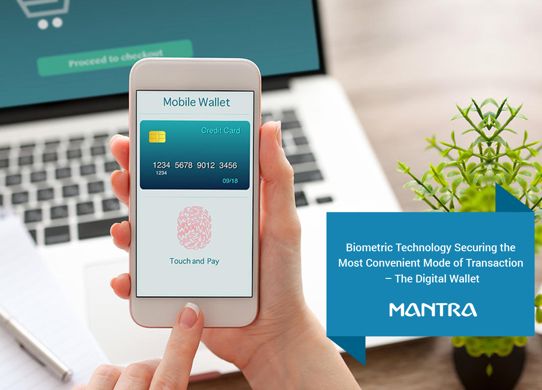With the adoption and proliferation of smartphone devices, the digital transaction/payment market has undergone far-reaching shifts. A large chunk of the populace is utilising mobile phones to conduct transactions with ease & convenience. In effect, India’s digital payment industry manifested two-figure value growth during the period 2013-2017.
From recharge & bill payment, entertainment, food & travel payments, city services like making a cashless donation to mall shopping and much more, the digital wallet permit a user to make instant payment online without the requirement of making a payment in cash or through plastic cards.
Moreover, the constant need for changing passwords or PINs with a safer alternative has laid the developing & developed countries to adopt biometric technology as a feasible solution for secure digital transactions/payments.
As per the Reserve Bank of India, from only one in 2006 up to sixty in 2017, the number of enterprises offering digital wallet services has swooped up stupendously.
The Digital Wallet: Introduction
After smartphones have gained dominance over the world and became an internet access control tool, there has been a tremendous increase in global online commerce & payment industry. A digital wallet is an online financial service providing platform which encourages ‘cashless payment’.
The ‘digital wallet’ is an electronic payment platform such as a mobile application or any other online money transfer mode; however, there is a thin line between the terms mobile wallet & an e-wallet. The word “mobile wallet” pertains to the execution of the digital wallet for smartphones/mobile devices whereas the term “e-wallet” connotes the implementation of the digital wallet for the browser or desktop environment.
With the introduction of Apple Pay in autumn 2014, the world observed an emergence of digital wallet space for in-store payments. However, the conception of digital wallet persists since the commencement of the e-commerce industry. To support the first massive online marketplace eBay, Paypal has created a digital wallet as a mobile accessible payment system.
Additionally, the digital wallets are capable of carrying out numerous financial services ranging from peer-to-peer (P2P) payments, checking account balance-inquiry, supporting loyalty programs (coupons, gift vouchers or rewards) to other online payment functions.
The Way Forward for Digital Wallet in India
Before the Digitization, cash payment was the prefered mode across the nation. In India, 95% of the transactions were through cash before the demonetisation. However, after the demonetisation, digital payment acceptance increased drastically in India.
Besides, GOI plays a vital role in pushing the digital payment market with the inclusion of Biometric POS-based transaction modes like Aadhaar-based Payment System (AePS), USSD, BHIM, Micro ATMs, etc.
Consequently, during 2013-2017, Indian mobile wallet market witnessed a steep rise with a CAGR of 67.10% despite compulsory KYC rules.
The National Payments Corporation of India (NCPI) has introduced secure & rapid digital payment system “Unified Payments Interface” (UPI) to interbank payment through mobile. Up till March 2019, UPI recorded transactions worth Rs. 1.3 lakh which accounts for 800 million transactions.
Boom in Digital Wallets and UPI Apps
Nowadays, merchants, financial institutions, retailers, consumers, etc. are using multiple UPI apps & digital wallets designed by distinct digital wallet providers such as Paytm, Google Pay, Mobikwik, Amazon Pay, Oxigen, ICICI pockets, PhonePe, Jio Money, BHIM App, HDFC Payzapp and others.
BHIM UPI App is the best instance of a stringent digital wallet having the potential to power several bank accounts, to support seamless routing & merchant payment onto a single digital platform with enhanced biometric security.
In the current time, “Google Pay” is the leading App in UPI transactions nationwide. In 2019, “Google Pay” has recorded payments worth Rs 43,000-45,000/- crore and “PhonePe” is marginally ahead of “Paytm”.
So far, 85% of consumers have installed the digitals wallets & fintech apps to make instant online payment without a hitch. Furthermore, every month, the country witnesses a 30% rise in the number of digital transactions.
The Future of Biometric-led Digital Wallets
Are you scared of utilising digital wallets or are you afraid of falling into the trap of fraudsters? Thanks to Biometrics because you do not need to worry any longer. With the embodiment of the state-of-the-art & secured biometric technology, it’s time to strengthen the Indian payment ecosystem.
Arising security breaches in the Indian digital wallet market calls for sturdy and reliable technology. Hence, concerning the authenticated digital transactions, several wallet providers headed towards the adoption of Biometrics.
Biometrics Bridging the Indian Digital Wallet Market
Furthermore, BHIM App is developed based on Biometric technology designed for merchants so that they can validate & identify the user based on his physical attributes like fingerprint impression.
Additionally, the financial institutions are extensively using Aadhaar based payment system (AePS) for providing secure banking & financial services to the account holders with the aid of biometric fingerprint scanner or iris scanner.
Praveen Dadabhai, CEO of a wallet company ‘Payworld’ said: “Even though the KYC process was a pain point for the industry we were able to manage it because of Aadhaar biometric based verification.”
The Benefits of Utilising Biometrics in Digital Wallet
Secure enrollment of the user/consumer
Keeps away the fraudsters
Simple to use
Avoids the online payment scams
Saves users from fake transactions and fake Apps
Instant money transfer on just one tap through biometric fingerprint verification

Adil Masoodi
Hmm
ReplyRatulmondal
Manta kyc
Reply